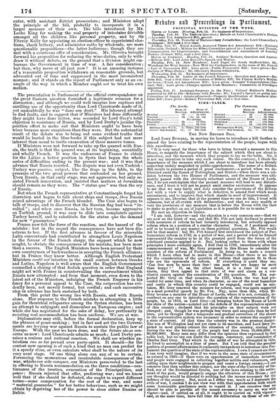The presentation to Parliament of the official correspondence on the
great Eastern question furnished a legitimate occasion for a discussion; and although we could well imagine less captious and cavilling use of the opportunity than Lord Clanricaixie made of it, yet undoubtedly he was " dans son droit." His laboured attempt to find faults, and to suggest that if Ministers had done differently they might have done better, was seconded by Lord Grey's total objection to resistance of Russia, and by Lord Derby's jocular Op- position effort to make out that Ministers ought to have been wiser because more suspicious than they were. But the substantial result of the debate was to bring out some evident truths that would lie buried in the blue-books if this subject had not more interest than usual to incite excavation of those massive tomes.
If Ministers were not forward to take up the quarrel with Rus- sia, the truth is that the quarrel was, at its beginning, essentially and wholly French. It was the endeavour of France to obtain for the Latins a better position in Syria that began the whole series of difficulties ending in the present war; and it was that advance that Russia resisted. The dispute was not even Turkish : Turkey was passive, subject, like the frogs in the fable, to the pressure of the two great powers that contended on her ground. Even Russia, in that early stage, was not aggressive, but only re- sisted French innovation, and insisted that matters at Jerusalem should remain as they were. The "status quo" was then the cry of Russia.
But when the French representative at Constantinople forgot his discretion and began to talk about ships and troops, then Russia seized advantage of the French blunder. The Czar also began to talk of troops, and to discover that the Russian flag had been "in- sulted" • and when once Russia, in her turn, became aggressive oA Turkish ground, it was easy to slide into complaints against Turkey herself, and to substitute for the status quo the demand for new "guarantees."
France now felt the force of the reaction, and the hazard of the mistake : but in the sequel the consequences have not been dis- astrous to her. If the first advance in favour of the miserable Latin conventuals had contributed to strengthen Louis Napoleon in the favour of the French clergy, the support which he now sought, to obviate the consequences of his mistake, has been more than a success. The English Ministers have been accused by their own countrymen of backwardness in accepting the French alliance; but in France they know better. Although English Protestant Ministers could not interfere in the small contest between Greeks and Latins, Napoleon is well aware that the English Government counselled a closing of that foolish question in order that England might act with France in countervailing the encroachment which Russia now attempted : and from that moment, even down to the latest act of the Ministers, indulging the French Emperor in his fancy for a personal appeal to the Czar, the cooperation has evi- dently been, not merely formal, bat cordial; and each successive step in advance has been sustained by both. From this point the wrong lies with Russia, and with Russia alone. Her response to the French mistake in attempting a little gain for theatrical reliquaries among the Syrian shrines, has been- an-attempt to subjugate and dismember an European empire; and while she has negotiated for the sake of delay, her pertinacity in resisting real accommodation has been uniform. We are at war.
Diplomatists may still, before the formal declaration, keep up the phrases of peace-making ; but in fact and act the two Govern- ments are levying war against Russia to sustain the public law of Europe. With the past we have done, and the future aloae con- cerns us flow: Lord Clanricarde admits as much; Lord Derby pro- mise a zealous and national coaetion. We shall see whether pa- triotism can so far prevail over party-spirit. It should—for the contest now opening is of such a kind that no man can predict for it a speedy close, or even calculate what shall be the nature of its very next stage. Of one thing alone can any.of us be certain. Foreseeing the momentous and incalculable consequences of the war, whichever side conquer, our Ministers persevered to the last in offering to Russia accommodation on the three conditions—eon- tinuattee of the treaties, evacuation of the Principalities' and peace : Russia rejected that offbr, preferring war; and we know well that if she Should be defeated, she ought to expect different terms—some compensation for the cost of the war, and some "material guarantee" for her better behaviour, such as we might obtain by depriving her of the power to close either Enxine or Beni&
































 Previous page
Previous page